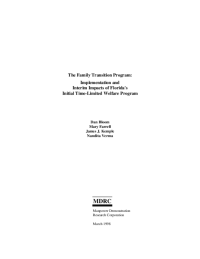Implementation and Interim Impacts of Florida's Initial Time-Limited Welfare Program
This is the third report in MDRC’s multi-year evaluation of Florida’s Family Transition Program (FTP), one of the first welfare reform initiatives in the nation to impose a time limit on the receipt of cash assistance.
The report finds that FTP’s impacts are occurring in stages. In the first two years of the follow-up period, before participants could have reached FTP’s time limit (24 months for most recipients), the program increased employment rates and earnings, but did not affect the rate of welfare receipt. Thus, the program’s primary effect was to increase the proportion of people who were combining work and welfare. FTP also raised families’ combined income from public assistance and earnings. (Although the program did not reduce the number of people receiving welfare during this period, it did reduce the average amount of welfare payments per person.)
Findings for the first enrollees to enter the study suggest that the pattern of results began to change just after the two-year point, as small numbers of FTP participants began to reach the time limit and have their welfare benefits canceled. FTP began to generate significant reductions in the rate of welfare receipt at that point. Also, FTP began to increase the proportion of people who were working and not receiving cash assistance.
The report also describes the multi-stage process that occurs as FTP participants approach the time limit. To date, almost all those who used up their allotted months of benefit receipt had their benefits canceled. At the same time, only a small proportion of FTP participants have reached that point; most left welfare before reaching the time limit, and still had some time remaining on their "clocks." Finally, the report provides contextual information that is critical to interpreting the impact results. For example, it illustrates that FTP involved much more than a time limit – the program has been generously funded, and has provided an unusually rich array of services and supports to its participants. In addition, the report notes that FTP has operated in a strong labor market, during a time when Florida’s statewide welfare caseload has dropped precipitously.
The unfolding story of FTP provides a preview of the issues and potential impacts of more recent welfare reform initiatives being implemented in Florida and other states under the 1996 federal welfare law. Although the story is far from over, the study is already providing valuable early data. Future reports in the study will continue to document the results of this important program, and will address critical open issues, such as how families fare after their welfare grants are canceled.






